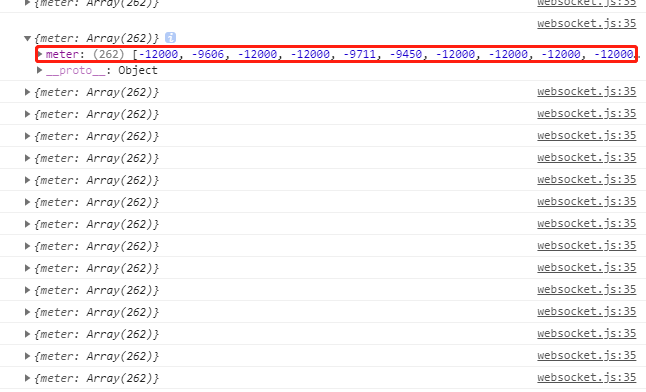js+css实现后台数据返回页面改变页面图片的高度
实现功能:通过websocket实时数据,改变页面图片的高度,做到一个音频的电平跳动效果
有没有大神有类似的demo或者方法提供参考下,的确是有点懵的。
这个就是我页面收到的电平跳动数据,现在想用图片来显示在页面,通过拿到数据调整图片高度来完成电平跳动的效果。有没有大佬有更好的方法。我实在还没弄懂,有没有可以参考的demo,谢谢。
<!DOCTYPE html>
<html>
<head>
<title></title>
<style type="text/css">
.container{
display: flex;
flex-direction: row;
align-items: flex-end;
height: 200px;
}
.item{
background-image: linear-gradient(red,#0000ff70,#00800057);
display: flex;
justify-content: space-between;
height: 200px;
width: 100px;
flex-direction: column;
}
.item .first{
transition: all 100ms
opacity: 0
}
.other{
background-color: #ffffff;
transition: all 100ms;
}
</style>
</head>
<body>
<div class="container">
<div class="item">
<div class="other"></div>
<div id="div1" class=" first"></div>
</div>
<div class="item">
<div class="other"></div>
<div id="div2" class=" first"></div>
</div>
<div class="item">
<div class="other"></div>
<div id="div3" class=" first"></div>
</div>
<div class="item">
<div class="other"></div>
<div id="div4" class=" first"></div>
</div>
<div class="item">
<div class="other"></div>
<div id="div5" class=" first"></div>
</div>
</div>
<script type="text/javascript">
setInterval(function () {
for (var i = 5; i > 0; i--) {
var hello = document.getElementById('div' + i);
hello.style.height = parseInt( Math.random() * 200) + 'px'
parent = hello.parentNode;
parent.getElementsByClassName('other')[0].style.height = (200 - parseInt( Math.random() * 200)) + 'px'
}
}, 100)
// ws接收并解析数据
// ws.onmessage = function(msg) {
// // 解析msg
// // 解析出来的数据按一定比例设置为div高度
// }
</script>
</body>
</html>
如果用echarts,你可以看看这个例子
https://echarts.apache.org/examples/zh/editor.html?c=dynamic-data
把代码底部的部分代码注释掉(以//开头),会更好理解些
app.count = 11;
setInterval(function (){
var axisData = (new Date()).toLocaleTimeString().replace(/^\D*/, '');
var data0 = option.series[0].data;
var data1 = option.series[1].data;
data0.shift();
data0.push(Math.round(Math.random() * 1000));
data1.shift();
data1.push((Math.random() * 10 + 5).toFixed(1) - 0);
//option.xAxis[0].data.shift();
//option.xAxis[0].data.push(axisData);
//option.xAxis[1].data.shift();
//option.xAxis[1].data.push(app.count++);
myChart.setOption(option);
}, 2100);
<!DOCTYPE html>
<html lang="en">
<head>
<meta charset="UTF-8">
<meta name="viewport" content="width=device-width, initial-scale=1.0">
<meta http-equiv="X-UA-Compatible" content="ie=edge">
<title>HTML5音频可视化频谱跳动代码</title>
<style>
* {
margin: 0;
padding: 0;
}
#canvas {
display: block;
background: linear-gradient(135deg, rgb(142, 13, 133) 0%, rgb(230, 132, 110) 100%);
}
</style>
</head>
<body>
<audio id="myaudio" src="./mp3.mp3"></audio>
<canvas id="canvas"></canvas>
<script>
window.onload = function () {
var oAudio = document.getElementById('myaudio');
window.onclick = function () {
if (oAudio.paused) {
oAudio.play();
} else {
oAudio.pause();
}
}
// 创建音频上下文对象
var oCtx = new AudioContext();
// console.log(oCtx);
// 创建媒体源,除了audio本身可以获取,也可以通过oCtx对象提供的api进行媒体源操作
var audioSrc = oCtx.createMediaElementSource(oAudio);
// 创建分析机
var analyser = oCtx.createAnalyser();
// 媒体源与分析机连接
audioSrc.connect(analyser);
// 输出的目标:将分析机分析出来的处理结果与目标点(耳机/扬声器)连接
analyser.connect(oCtx.destination);
// 效果(实现的具体方法)
// 绘制音频图的条数(fftSize)
/*
根据分析音频的数据去获取音频频次界定音频图的高度
放在与音频频次等长的8位无符号字节数组
Uint8Array:初始化默认值为1024
*/
// 利用cancas渐变进行音频绘制
var ctx = canvas.getContext('2d');
canvas.width = window.innerWidth;
canvas.height = window.innerHeight;
var oW = canvas.width;
var oH = canvas.height;
var color1 = ctx.createLinearGradient(oW / 2, oH / 2 - 30, oW / 2, oH / 2 - 100);
var color2 = ctx.createLinearGradient(oW / 2, oH / 2 + 30, oW / 2, oH / 2 + 100);
color1.addColorStop(0, '#000');
color1.addColorStop(.5, '#069');
color1.addColorStop(1, '#f6f');
color2.addColorStop(0, '#000');
color2.addColorStop(.5, '#069');
color2.addColorStop(1, '#f6f');
// 音频图的条数
var count = 150;
// 缓冲区:进行数据的缓冲处理,转换成二进制数据
var voiceHeight = new Uint8Array(analyser.frequencyBinCount);
// console.log(voiceHeight);
function draw() {
// 将当前的频率数据复制到传入的无符号字节数组中,做到实时连接
analyser.getByteFrequencyData(voiceHeight);
// console.log(voiceHeight);
// 自定义获取数组里边数据的频步
var step = Math.round(voiceHeight.length / count);
ctx.clearRect(0, 0, oW, oH);
for (var i = 0; i < count; i++) {
var audioHeight = voiceHeight[step * i];
ctx.fillStyle = color1; // 绘制向上的线条
ctx.fillRect(oW / 2 + (i * 10), oH / 2, 7, -audioHeight);
ctx.fillRect(oW / 2 - (i * 10), oH / 2, 7, -audioHeight);
ctx.fillStyle = color2; // 绘制向下的线条
ctx.fillRect(oW / 2 + (i * 10), oH / 2, 7, audioHeight);
ctx.fillRect(oW / 2 - (i * 10), oH / 2, 7, audioHeight);
}
window.requestAnimationFrame(draw);
}
draw();
/*
analyserNode 提供了时时频率以及时间域的分析信息
允许你获取实时的数据,并进行音频可视化
analyserNode接口的fftSize属性
fftSize:无符号长整型值,用于确定频域的FFT(快速傅里叶变换)
ffiSize属性值是从32位到32768范围内的2的非零幂,默认值是2048
*/
}
</script>
</body>
</html>